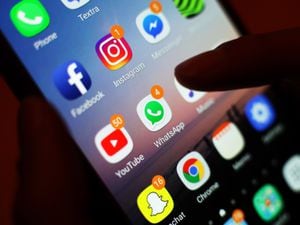How to prevent and deal with online sexual abuse as Emily Atack details explicit messages
Victims of online sexual abuse have been advised what to do if they are sent explicit pictures or messages.

It comes after the announcement of a new BBC documentary by actress and presenter Emily Atack, best known for her roles in The Inbetweeners and I'm a Celebrity.
The documentary, titled Emily Atack: Asking For It?, details the TV star's own personal experience as a victim of online sexual abuse. In an interview with The Times, Ms Atack said she "feels like she is being sexually assaulted hundreds of times a day".
The unsolicited messages sent to her include rape threats, harassment, and cyberflashing – the action of sending an explicit sexual image via social media, dating apps, or any other online platform, without consent. As of March 2022, cyberflashing became a criminal offence, with perpetrators facing up to two years behind bars.
Announcing the decision, the UK government said: "The offence will ensure cyberflashing is captured clearly by the criminal law – giving the police and Crown Prosecution Service greater ability to bring more perpetrators to justice. It follows similar recent action to criminalise upskirting and breastfeeding voyeurism with the Government determined to protect people, particularly women and girls, from these emerging crimes."
Online sexual abuse can happen to anyone, including children. The NSPCC revealed that from 2021 - 2022, there were 6,156 Sexual Communication with a Child offences, an increase on the previous year, and almost 120 offences per week on average. The harrowing statistics also revealed that four in five (82 per cent ) of grooming cases last year, where gender and age was recorded, were against girls aged from 12 to 15, making up 39 per cent of all victims.
West Midlands Victims' Commissioner Nicky Brennan is troubled by the fact that the sending of such messages has become 'normalised' to the point that those who speak out are receiving further abuse.
She said: "To send sexualised messages there needs to be a level of consent. People often think that you should take these messages and pictures as a compliment.
"In reality it makes me feel unsafe, it makes me feel sick and it makes me feel violated. Receiving unsolicited messages or pictures of a sexual nature is triggering. As a survivor of domestic abuse and sexual assault it makes me feel triggered about past experiences in my life.
"What I worry about is that messages like this have become so normalised that when women like Emily Atack speak out about it, they get awful abuse.
"If someone gets these kind of messages I would recommend keeping a log of what was received and when. It may not be a one off and may be repeat behaviour. If you are feeling unsafe, if it is unwanted and repetitive I think you should report it to the police and you should report it to the social media companies.
"We need to talk about consent more openly in schools and society. It is only getting worse and women shouldn’t have another thing to worry about."
On iPhones, the 'Airdrop' feature allows photos to be received via bluetooth. Strangers on public transport and in public spaces are able to send images using this feature.
To prevent this, iPhone users can go to their 'Settings' app and select 'General'. Airdrop settings can be changed by clicking 'Recieving off' – this will stop anything being sent on Airdrop. Another option is to select 'Contacts Only' – only your contacts can send images this way.
On Android phones, the Nearby Share feature can also be disabled by going to settings, connected devices, connection preferences, Nearby Share. Users can then choose who can share items to their device.





